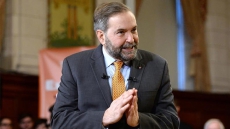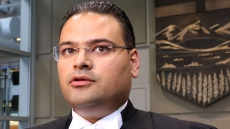OTTAWA — A left-leaning advocacy organization and a national student group will be in Ontario Superior Court on Thursday and Friday hoping to relax voter identification rules for the looming federal election.
The court factum prepared by the Council of Canadians and the Canadian Federation of Students argues that tens of thousands or more of eligible voters will be denied a ballot this October due to changes enacted last year by the Conservative government.
The groups want the court to issue an interim injunction allowing Elections Canada to recognize as valid ID the voter identification cards that are mailed to everyone on the voters' list.
Some 400,000 Canadians used the voter identification cards in the 2011 election as part of a pilot project that Elections Canada wanted to expand to the whole country.
Instead, the Harper government — citing fear of voter fraud — passed a new law that increases the ID requirements of would-be electors while ruling out the use of the Elections Canada mail-outs that tell people where to vote.
Critics of the changes, including past and present chief electoral officers from across the country, say the strict ID rules will primarily impact the young, the elderly in care, students who move often, the homeless and natives on reserves — groups that might be less inclined to vote for the governing Conservatives.
"Public confidence in the electoral process is clearly at the greatest risk when actions are taken to suppress or otherwise interfere with the right to vote," the factum argues, "not when the CEO (chief electoral officer), an officer of Parliament, takes steps to enable or facilitate the exercise of that right."
The Council of Canadians and the student federation also have launched a constitutional challenge of the legislation, dubbed the Fair Elections Act, saying it infringes the charter-protected right to vote.
But that constitutional case won't be heard until after this October's anticipated election and, in the meantime, the groups say "irreparable harm" may be done to up to half a million Canadians turned away at the polls because they have inadequate identification.
Pierre Poilievre, the Conservative minister responsible for democratic reform, said in an email there are plenty of ID options for would-be voters.
"With the Fair Elections Act, Canadians can choose from 39 authorized forms of ID when voting," said Poilievre.
"These easily attainable documents range from Canadian passports and birth certificates to student ID cards, credit or debit cards, and utility bills or bank statements."
But the council and the student federation argue that for a subset of electors, getting ID that includes a home address can be extremely difficult.
The court factum states that in some elections, as many as 95 per cent of electors used a driver's licence to vote. For the estimated 14 per cent of Canadians over age 18 who don't have a driver's licence, photo ID that includes a name and home address is almost non-existent.
Until 2007, Canadians who were on the list of electors were not required to show ID at the polls, but could simply state their name and address to be provided with a ballot.
The Harper government brought in voter ID rules in 2007, then toughened them further with the 2014 Fair Elections Act. It also ended the practice of vouching, in which a voter with ID could attest for the identity and local residence of another elector.
A study by former B.C. chief electoral officer Harry Neufeld found that about 120,000 people voted in 2011 after being vouched for, in addition to the 400,000 Canadians who used their voter identification cards as a piece of ID.
Neufeld found no evidence of voter fraud.



